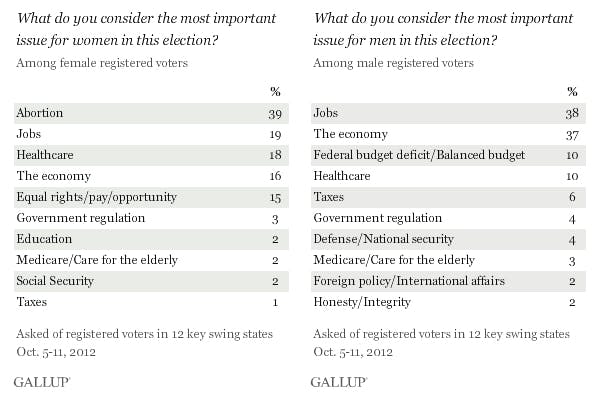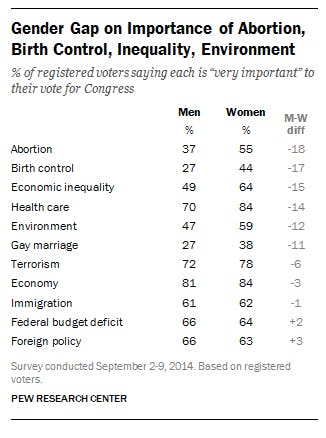On Sunday, Senator Joni Ernst appeared on CNN’s State of the Union and, predictably, took a moment to scrutinize Hillary Clinton. “It’s not enough to be a woman,” said Ernst. “You have to care about women’s issues. And women’s issues here in Iowa are that we have a strong economy. We have jobs that our sons and daughters can go off to someday. We have a great educational system. And women want strong national defense. We want to know that our families are going to be safe.” But those aren’t “women’s issues”—in Iowa or in the rest of the country.
It may sound like Ernst is referencing polling results, but it appears there hasn’t been any recent formal polling on which issues are most important to Iowan women. Nor does Ernst perform particularly well with them: In her winning 2014 Senate campaign, she only managed to split female voters with Democratic candidate Bruce Braley; that's likely because the economy and health care eclipsed what are normally wedge issues, like abortion or gay marriage.
But if female voters in Iowa are anything like those in the rest of the country—and Iowa is a swing state, after all—then Ernst is off the mark on what's most important to them.
Leading up to the 2012 election, Gallup asked female registered voters in 12 swing states, "What do you think is the most important issue for women in this election?” Thirty-nine percent said abortion (without specifying support or opposition). Jobs and health care ranked second and third, with 19 percent and 18 percent, respectively. The economy and “equal rights/pay/opportunity” ranked fourth (16 percent) and fifth (15 percent). Male registered voters, on the other hand, ranked jobs and the economy as men’s top two issues.
Two percent of female respondents said education as most important, but national defense did not rank among women—and only drew 4 percent of male respondents.

Indeed, abortion continues to be a critical issue among women nationally. A Pew Research Center survey conducted in September of 2014 found a significant gender gap between men and women in terms of how “important” an issue was “to their vote for Congress.” Fifty-five percent of women ranked abortion as very important, compared to 37 percent of men. In a similar discrepancy, 44 percent of women said birth control was very important, while only 27 percent of men said the same. Economic inequality was ranked very important by 64 percent of women, versus 49 percent of men, while health care was deemed very important by 84 percent of women and 70 percent of men.

Ernst wasn’t exactly wrong about jobs and the economy—they're important to female voters, too—but calling them women’s issues is a misnomer. If anything, they’re “men’s issues” because men are more likely to rank them as top issues in elections, but it would be even more accurate to simply say they're important to all voters.
The polls show, meanwhile, that abortion and health care are indeed “women’s issues.” Where does Ernst stand on these? She has supported a “personhood” amendment, and in a campaign ad last year, she pulled a gun from her purse and shot at a target, while a voiceover said, “Once she sets her sights on Obamacare, Joni’s gonna unload.”
Needless to say, Second Amendment rights don't rank as a top issue among female voters.
